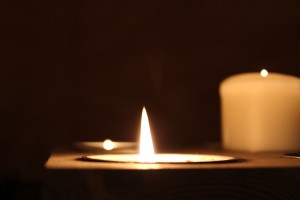Manic: affected with or marked by frenzy
Cultural pluralism has intersected with capitalist consumerism, and a byproduct of it is what I’m calling spiritual mania. It happens because the world in which we live creates tons and tons of wasted. There’s wasted packaging, wasted time spent on trivialities, wasted relationships that have become as commodified and disposable as an consumer product, and wasted environments, poisoned as they are by the entire system that has displaced creativity, meaningful work and relationships, and sustainability, with consumerism and waste. Worst of all, the system (world forces of darkness is how Paul puts it in Ephesians 6) offers wasted lives as its crowning achievement. It’s seen in rates of divorce, incarceration, bankruptcy, suicide, and o so much more. It’s felt in countless millions of ways, as for example in the young woman with over a thousand facebook friends, living with a “violent boyfriend” (can you see the strange contradiction in that phrase) who sobbed for most of session with her therapist because, while filling out a job application she was paralyzed when she came to “In case of emergency, contact: _________”
“I have no name to put there” she said, before bursting into tears again.
This is the way of it – the way of emptiness, loneliness, longing, despair – of lives laid waste. The void of creativity, intimacy, and meaning, is met with a searching in our culture, and it’s right there at the point of searching that I begin worry because to search for meaning in western civilization is to enter into a carnival where endless barkers are calling. “Buy me” “Taste Me” “Read me” “Touch Me” as westernized forms of Shamanism, Buddhism, Hinduism, Taoism and o so many more offer ways to fill the void. We become sojourners, wandering through the dessert in search of our own oasis of meaning. That we’re looking at all is, likely, a sign of hope.
The problem, though, is that the mindset through which we approach are seeking is identical to the mindset that got us in trouble in the first place. We’re still consumers, in search of spiritual goods and services, for which we’re willing to pay money, time, even perhaps some sort of moral confinement. In exchange, though, the product had better deliver, because if it doesn’t we’re out.
We don’t fix broken appliances anymore. They’re not worth it.
We’re fixing broken relationships less and less, because they too have been devalued.
We switch jobs, schools, spouses, sexual partners, banks, towns, all the time – whenever, in fact, the promise of something better comes along.
Our spirituality then, if it draws from the same waters, is also disposable.
Thus do people move into the stillness of Buddhism until it no longer delivers, at which point we might try a bit of Sufism, or a Drum Circle, or a different Eco-therapy, or… whatever. Two years here, another one there, a year over there, six months there. With each change, there’s perhaps fresh hope, for a while. Eventually though, they’re quicker still to move and discard, as the time grows short and the seeds of cynicism find roots, giving voice to the despair that they’ll never find anything meaningful. The same thing happens within the confines of any single worldview, especially Christianity. We change churches like we change clothes, often because the spiritual product is better “over there” where it’s smaller, or bigger, or the music is better (whatever that means). Another form of mania is an obsessive performance fixation: read more, pray more, give more, serve more.
The sad reality with all this is that a manic search for perfection will inevitably become the very thing that puts true meaning, peace, and intimacy out of reach. To become deeply settled in an intimate relationship with God and a community intent on making God’s good reign visible requires a few adjustments:
1. The Great Deception’s been named – Paul warns about people who are “always learning, but never able to come to a knowledge of the truth”. That describes people who are great at talking about ideas, faith, morality, ethics, meaning, truth, beauty, service, justice, mercy, compassion, and hope. Just don’t ask them to live out the ideals they espouse so eloquently. A quick glance through the Bible reminds me that our problem of elevating words to a higher place than they deserve has been around a long time. “These people honor me with their lips, but their hearts are far from me” is how Isaiah the prophet put it. Later, Paul would say that “the kingdom of God does not consist in words but in power”. I like words, like talking, like concepts. But in a hyper educated culture like ours its easy to confuse words with reality. Looking to embody spiritual reality through words alone, though, would be like trying to climb a poster of a mountain.
I love how Dostoyevsky articulates this when he writes: “The more I love humanity in general the less I love man in particular. In my dreams, I often make plans for the service of humanity, and perhaps I might actually face crucifixion if it were suddenly necessary. Yet I am incapable of living in the same room with anyone for two days together” Indeed. I’ll never get anywhere until I begin to measure my spirituality in terms of how well I actually serve, love, bless, and bring peace to my world.
2. There’s one main thing– I spoke at a conference recently where they paid the speakers in smoked salmon instead of money. That was fine by me, but walking through the halls of the event created a sense of discontent as I realized how easy it is to believe that the secret to my fulfillment, or my peace, or my effectiveness, is right there in the next booth, where the curriculum salesman is offering free cupcakes in hopes that folks will stop in and consider it. Taize. Formation. Mission Trips. Justice Initiatives. Clean Water. Homeless Shelters. Camp. Radio. Bible College. Books (including mine). They’re all there for the buying. It’s the Christo-industrial machine – and I don’t like it one little bit.
When I get discouraged by what I perceive to be the manic seeking of others, or my own manic seeking, or worse, the haunting question of whether I’m one of the sellers – I always return to the most life giving place in the Bible for me, which is Jeremiah’s 9th chapter. A Bible teacher took me there one night, two years after my father had died suddenly (during my last year of high school). It says, “Let not the wise man boast of his wisdom, nor the mighty man boast of his might. Let not a rich man boast of his riches; but let him who boasts boast of this, that he understands and knows Me, that I am the LORD….” That’s it. That’s the most important thing in all life, the headwaters from which meaning, calling, healing, hope, and direction will come. God has spoken and has said He can be known – as friend, parent, lover, healer, life giver, creator. Not only can God be known, but God says that knowing God is the one thing in the universe worth boasting about. Do you know God?
Whenever I return there, the manic, soul sucking noise of my world is overwhelmed by the majesty and glory of God, and suddenly God is all I want, all I need, once again. I don’t need another curriculum, or a Big Audacious Goal, or another book to read in search of meaning, or a movie to watch in search of entertainment. I don’t really even need to see the season finale of anything. I may read, or watch, or plan… but it will flow out from wholeness rather than to fill a void – and I’m at rest. Knowing God makes all the difference.
Part 2… continues in a day or two. See you then…











